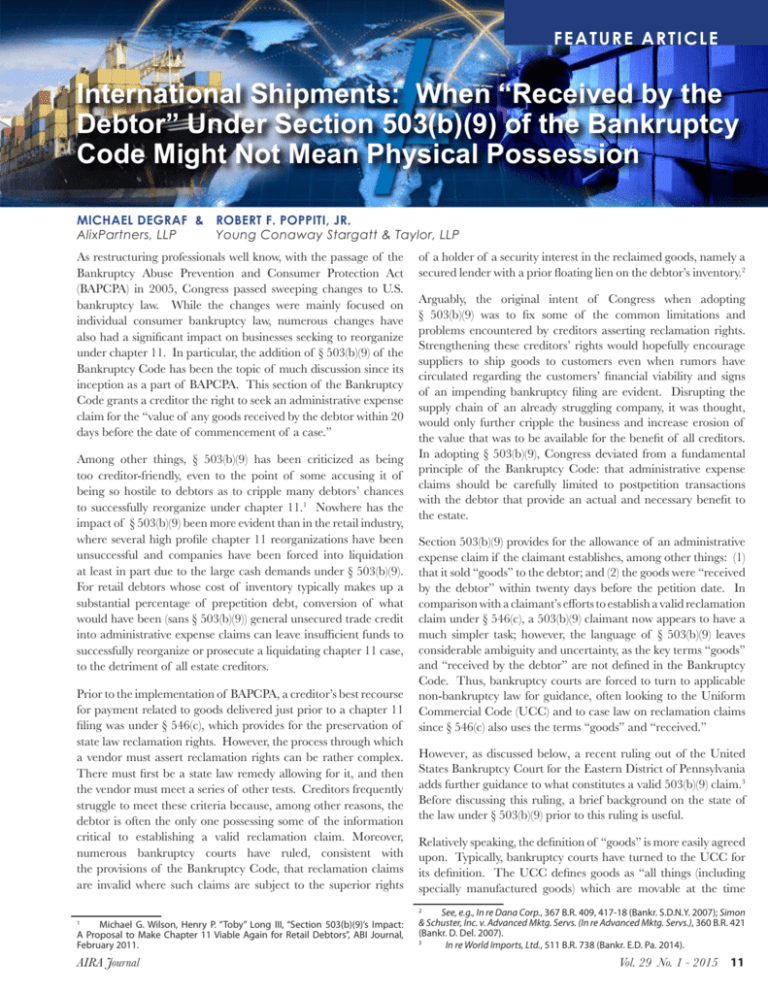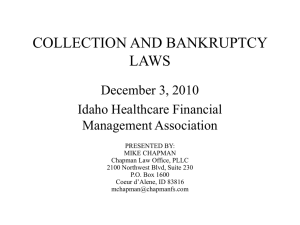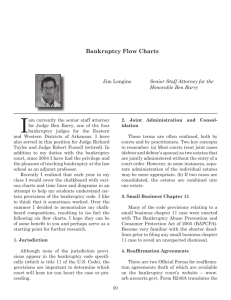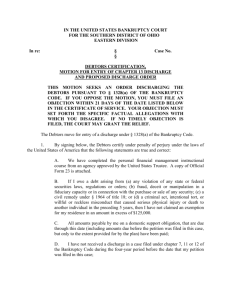here. - Young Conaway Stargatt & Taylor, LLP
advertisement

F E ATU RE ARTI C LE International Shipments: When “Received by the Debtor” Under Section 503(b)(9) of the Bankruptcy Code Might Not Mean Physical Possession MICHAEL DEGRAF & ROBERT F. POPPITI, JR. AlixPartners, LLP Young Conaway Stargatt & Taylor, LLP As restructuring professionals well know, with the passage of the Bankruptcy Abuse Prevention and Consumer Protection Act (BAPCPA) in 2005, Congress passed sweeping changes to U.S. bankruptcy law. While the changes were mainly focused on individual consumer bankruptcy law, numerous changes have also had a significant impact on businesses seeking to reorganize under chapter 11. In particular, the addition of § 503(b)(9) of the Bankruptcy Code has been the topic of much discussion since its inception as a part of BAPCPA. This section of the Bankruptcy Code grants a creditor the right to seek an administrative expense claim for the “value of any goods received by the debtor within 20 days before the date of commencement of a case.” Among other things, § 503(b)(9) has been criticized as being too creditor-friendly, even to the point of some accusing it of being so hostile to debtors as to cripple many debtors’ chances to successfully reorganize under chapter 11.1 Nowhere has the impact of § 503(b)(9) been more evident than in the retail industry, where several high profile chapter 11 reorganizations have been unsuccessful and companies have been forced into liquidation at least in part due to the large cash demands under § 503(b)(9). For retail debtors whose cost of inventory typically makes up a substantial percentage of prepetition debt, conversion of what would have been (sans § 503(b)(9)) general unsecured trade credit into administrative expense claims can leave insufficient funds to successfully reorganize or prosecute a liquidating chapter 11 case, to the detriment of all estate creditors. Prior to the implementation of BAPCPA, a creditor’s best recourse for payment related to goods delivered just prior to a chapter 11 filing was under § 546(c), which provides for the preservation of state law reclamation rights. However, the process through which a vendor must assert reclamation rights can be rather complex. There must first be a state law remedy allowing for it, and then the vendor must meet a series of other tests. Creditors frequently struggle to meet these criteria because, among other reasons, the debtor is often the only one possessing some of the information critical to establishing a valid reclamation claim. Moreover, numerous bankruptcy courts have ruled, consistent with the provisions of the Bankruptcy Code, that reclamation claims are invalid where such claims are subject to the superior rights of a holder of a security interest in the reclaimed goods, namely a secured lender with a prior floating lien on the debtor’s inventory.2 Arguably, the original intent of Congress when adopting § 503(b)(9) was to fix some of the common limitations and problems encountered by creditors asserting reclamation rights. Strengthening these creditors’ rights would hopefully encourage suppliers to ship goods to customers even when rumors have circulated regarding the customers’ financial viability and signs of an impending bankruptcy filing are evident. Disrupting the supply chain of an already struggling company, it was thought, would only further cripple the business and increase erosion of the value that was to be available for the benefit of all creditors. In adopting § 503(b)(9), Congress deviated from a fundamental principle of the Bankruptcy Code: that administrative expense claims should be carefully limited to postpetition transactions with the debtor that provide an actual and necessary benefit to the estate. Section 503(b)(9) provides for the allowance of an administrative expense claim if the claimant establishes, among other things: (1) that it sold “goods” to the debtor; and (2) the goods were “received by the debtor” within twenty days before the petition date. In comparison with a claimant’s efforts to establish a valid reclamation claim under § 546(c), a 503(b)(9) claimant now appears to have a much simpler task; however, the language of § 503(b)(9) leaves considerable ambiguity and uncertainty, as the key terms “goods” and “received by the debtor” are not defined in the Bankruptcy Code. Thus, bankruptcy courts are forced to turn to applicable non-bankruptcy law for guidance, often looking to the Uniform Commercial Code (UCC) and to case law on reclamation claims since § 546(c) also uses the terms “goods” and “received.” However, as discussed below, a recent ruling out of the United States Bankruptcy Court for the Eastern District of Pennsylvania adds further guidance to what constitutes a valid 503(b)(9) claim.3 Before discussing this ruling, a brief background on the state of the law under § 503(b)(9) prior to this ruling is useful. Relatively speaking, the definition of “goods” is more easily agreed upon. Typically, bankruptcy courts have turned to the UCC for its definition. The UCC defines goods as “all things (including specially manufactured goods) which are movable at the time See, e.g., In re Dana Corp., 367 B.R. 409, 417-18 (Bankr. S.D.N.Y. 2007); Simon & Schuster, Inc. v. Advanced Mktg. Servs. (In re Advanced Mktg. Servs.), 360 B.R. 421 (Bankr. D. Del. 2007). 3 In re World Imports, Ltd., 511 B.R. 738 (Bankr. E.D. Pa. 2014). 2 Michael G. Wilson, Henry P. “Toby” Long III, “Section 503(b)(9)’s Impact: A Proposal to Make Chapter 11 Viable Again for Retail Debtors”, ABI Journal, February 2011. 1 AIRA Journal Vol. 29 No. 1 - 2015 11 INTER N A T I ON A L , c onti nu ed of identification to the contract for sale other than the money in which the price is to be paid . . . and things in action . . .”4 Although it has been largely accepted that goods are tangible items that one can see and touch, the definition of goods is not without uncertainty. For example, some bankruptcy courts have found in favor of utility providers arguing that water, gas and electricity are goods for purposes of § 503(b)(9) (a consequence perhaps not contemplated by Congress), but even those courts have not always been in agreement on which of these utilities represent goods.5 Furthermore, to the extent that they are goods, proving the value of utilities that were received by the debtors during the twentyday window is both critical and often complicated. While parties often (but not always) agree upon the definition of goods, the definition of “received” is a hotly contested matter. Again, the Bankruptcy Code does not define “received,” so bankruptcy courts have regularly looked to the UCC for guidance. According to the UCC, “receipt” of goods is defined as “taking physical possession of them,”6 and this definition has been adopted by the bankruptcy courts in In re Wezbra Dairy, LLC,7 In re Momenta, Inc.,8 and In re Circuit City Stores9 as the appropriate meaning for “received.” Although these bankruptcy courts have found that receipt means taking physical possession, there still remains a lack of nationwide consensus on this point, as an overwhelming majority of jurisdictions do not have the benefit of precedent from their bankruptcy courts (let alone their federal appellate courts), which leaves the door open for interested parties to adopt the definition most advantageous to them when reconciling and asserting such claims. Given the lack of case law in this area, presumably a large number of these disputes are settled without the need for potentially protracted and costly litigation that could outweigh the benefit to either side. Moreover, a recent ruling from the United States Bankruptcy Court for the Eastern District of Pennsylvania has added further uncertainty to this arena, suggesting that in certain circumstances the UCC may not be the appropriate non-bankruptcy law to fill the definitional gaps left by the Bankruptcy Code. In In re World Imports, the bankruptcy court found that suppliers were not entitled to 503(b)(9) claims despite the fact that the debtor took physical possession of the goods sold within the twenty days prior to the petition date. The goods were shipped to the debtor FOB from Chinese ports, and were loaded onto vessels and shipped from China outside the twenty-day window. Not surprisingly, the suppliers argued that they were entitled to 503(b)(9) claims UCC § 2-105(1). 5 See, e.g., In re NE OPCO, Inc., 501 B.R. 233, 259-60 (Bankr. D. Del. 2013) (electricity is not a good but gas is); GFI Wisconsin, Inc. v. Reedsburg Util. Comm’n, 440 B.R. 791, 802 (W.D. Wis. 2010) (electricity is a good); In re Erving Indus., Inc., 432 B.R. 354, 370 (Bankr. D. Mass. 2010) (electricity is a good); In re Pilgrim’s Pride Corp., 421 B.R. 231, 240-43 (Bankr. N.D. Tex. 2009) (electricity is not a good but gas and water are). 6 UCC § 2-103(1)(c). 7 493 B.R. 768, 771 (Bankr. N.D. Ind. 2013) (“Thus, the key to determining when goods are received is possession – whether actual or constructive – not title.”) 8 455 B.R. 353, 359 (Bankr. D. N.H. 2011) (holding that the term received in § 546(c) is the equivalent of receipt in the UCC and that the term received in § 503(b)(9) must be interpreted identically and could include constructive possession). 9 432 B.R. 225, 230 (E.D. Va. 2010) (holding that received under § 503(b)(9) means “having taken into physical possession”). 4 12 Vol. 29 No. 1 - 2015 because the bankruptcy court, in defining “received” in § 503(b) (9), should adopt the UCC definition of receipt. The debtor and the creditors’ committee, on the other hand, maintained that the receipt date is controlled by international law, and according to accepted terms of international trade, an FOB sale occurs in the country of origin, at which point the goods are transferred to the purchaser once loaded onto the vessel. The premise of looking to state law when federal law is silent, as proposed by the claimants in World Imports, is, as noted above, well supported. That is, however, unless state law deviates from a federal interest. Specifically, Article VI of the U.S. Constitution (i.e., the Supremacy Clause) states that “This Constitution, and the Laws of the United States which shall be made in Pursuance thereof; and all Treaties made, or which shall be made, under the Authority of the United States, shall be the supreme law of the land…”10 Based on the Supremacy Clause, the debtor and the creditors’ committee in World Imports argued, and the bankruptcy court agreed, that the Convention on Contracts for the International Sale of Goods (CISG)—a federal treaty—and not the UCC should fill the definitional gap for the term “received,” because both the U.S. debtor and the Chinese supplier had ratified the CISG.11 Interestingly, however, the CISG, like the Bankruptcy Code, does not define “received.” But, the CISG does state that where it does not explicitly provide guidance, the involved parties are assumed to have made applicable to their contract the use of commonly known and accepted rules governing international trade.12 Therefore, the World Imports bankruptcy court looked to a set of commercial terms, known as Incoterms, established by the International Commerce Commission, used commonly in international trade and incorporated into the CISG. According to Incoterms, FOB stands for Free on Board, and under these shipping terms, the seller delivers the goods on board the shipping vessel at the named port of shipment. At this point, the risk of loss or damage to the goods passes to the buyer, and the buyer bears all costs going forward. Based on this, the World Imports bankruptcy court went on to find that once the debtor assumed the risk for the goods at issue, the goods were constructively received by the debtor. In this case, possession occurred at the Chinese port outside of the twenty-day window. Therefore, the bankruptcy court denied the claimants’ motions for allowance and payment of 503(b)(9) claims. Although it is likely that the reach of the World Imports decision is limited to transactions between a debtor and a supplier from nations that have both signed the CISG, the decision nevertheless represents another important decision in the developing case law under § 503(b)(9). With the ever-evolving globalization of business, the number of disputes and complex issues in this area of law is likely to further develop in the coming years. U.S. Const. Art. VI cl. 2. The CISG applies to “contracts of sale of goods between parties whose place of business are in different States...[w]hen the States are Contracting States,” CISG Art. 1(1)(a), and is a self-executing treaty with the preemptive force of federal law. In re World Imports, 511 B.R. at 743-44. The CISG governs unless the parties have excluded its application. CISG Art. 6. 12 Id. at Art. 9(2). 10 11 AIRA Journal From a practical perspective, with the benefit of the World Imports decision in hand, parties to an international business transaction should consider whether it is prudent to expressly provide in their contract or other agreement governing their business relationship that the CISG does not apply. For example, the parties might agree in writing that the CISG does not apply and that the UCC does. Of course, the best way for a supplier to protect itself is, and always will be, to place the purchaser on cash in advance to the extent possible in lieu of providing the financially troubled purchaser with payment terms. The opinions expressed are those of the authors and do not necessarily reflect the views of AlixPartners, LLP or Young Conaway Stargatt & Taylor, LLP or their respective affiliates, or any of their respective other professionals or clients. This article is for general informational purposes only and is not intended to be and should not be taken as legal advice. ABOUT THE AUTHORS MICHAEL DEGRAF Director| AlixPartners, LLP Michael has over 14 years of experience as a member of AlixPartners’ Information Management Services practice with a unique background of financial and technical skills. He has had significant roles helping to guide companies, including Eastman Kodak Company, General Growth Properties, Kmart, and Cable & Wireless through some of the largest bankruptcy cases in recent history. Michael has extensive experience leading teams through pre-bankruptcy contingency planning, business plan analysis, preparation of schedules of assets and liabilities and the statement of financial affairs, claims analysis and adjudication, reorganization plan and disclosure statement development, and creditor distributions of cash and equity. mdegraf@alixpartners.com ROBERT F. POPPITI, JR. Senior Associate| Young Conaway Stargatt & Taylor, LLP Rob is a senior associate at Young Conaway Stargatt & Taylor, LLP in Wilmington, Delaware. His practice focuses on representing debtors and other constituents (including lenders) in connection with chapter 11 proceedings. His current and past debtor representations include Trump Entertainment Resorts, Inc., Eastman Kodak Company, F & H Acquisition Corp. (the operator of Fox & Hound and Champps restaurants), Perkins & Marie Callender’s Inc., SmurfitStone Container Corporation, Heartland Publications, LLC and Building Materials Holding Corporation. rpoppiti@ycst.com AIRA Journal Vol. 29 No. 1 - 2015 13






